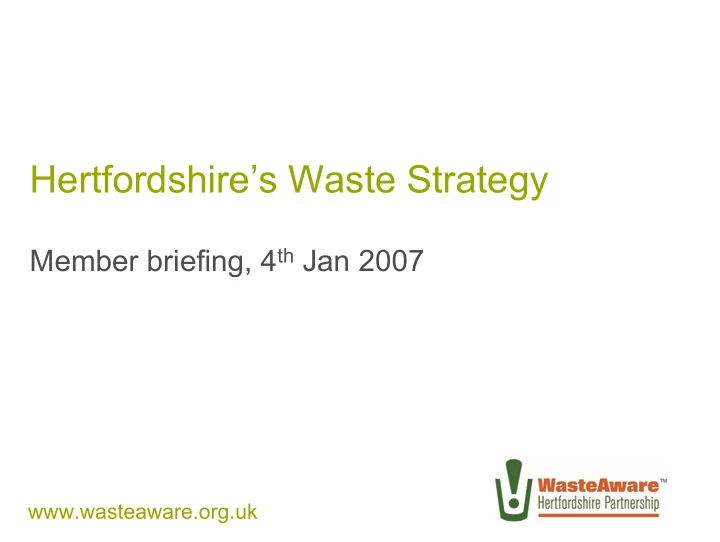

Hertfordshire’s Waste Strategy Member briefing, 4 th Jan 2007 www.wasteaware.org.uk
Agenda • Where are we now? • A new waste strategy for Hertfordshire • Public consultation, Jan-March 2007 • Questions www.wasteaware.org.uk
Where are we now? • 566,639 tonnes of municipal waste in 2005/06 • 33% recycled or composted in Herts • 49% recycled or composted at our HWRCs • 516 kgs per head of population • £22.79 per head www.wasteaware.org.uk
Where are we now? • £25.67m revenue budget in 2006/07 • Over £40 million spent collecting and disposing of household waste in 2005/06 • Currently, 60% sent to landfill www.wasteaware.org.uk
How do we compare? • 33% recycling (27%) • 49% HWRC recycling (42%) • 516 kgs/head (530/head) • £22.79/head (£27.25/head) * Figures sourced from independent research by National Association of Waste Disposal Officers www.wasteaware.org.uk
What are the challenges? • Best Value Performance Standards beyond the 30% in 2007/08 • LAA recycling and composting stretch target – 41.5% in 2008/09 • Hertfordshire recycling/composting target – 50% by 2012 • Draft National Waste Strategy targets – 25% by 2005 – 30% by 2010 – 33% by 2015 www.wasteaware.org.uk
What are the challenges? /2 • Pressure for self sufficiency • Landfill Allowances Trading Scheme (LATS) – 75% of 1995 level by 2009/10 – 50% by 2012/13 – 35% by 2019/20 • Animal By-Products Regulations 2005 • Waste Electrical and Electronic Equipment Regulations (WEEE) in July 2007 www.wasteaware.org.uk
What have we achieved so far? • WasteAware partnership 1997 • Hertfordshire Waste Partnership 2002 • Joint municipal waste management strategy for Hertfordshire 2002-24 • £5.7m external funds secured for further developing three-stream collection services • Composting facilities procured www.wasteaware.org.uk
Where do we want to be? • Reduction in generation of waste • Continuing strong performance on recycling and composting • The right infrastructure, in the right place, at the right time www.wasteaware.org.uk
Why change? • We’re running out of space – Landfill contracts run out between 2008 and 2010 – New landfill opportunities rapidly disappearing • Waste is damaging the environment – Landfill produces polluting liquid and methane which contributes to global warming • Cost of landfill is increasing – Landfill Tax increasing at £3 per tonne per year – Potential LATS penalties of £150 fine per tonne • Timetable for change is getting more urgent www.wasteaware.org.uk
How do we get there? • Phased approach to providing waste management/disposal infrastructure, building opportunity into our strategy • Financial modelling • Enhanced Hertfordshire Waste Partnership • Partnerships with neighbouring Waste Disposal Authorities www.wasteaware.org.uk
A new waste strategy for Hertfordshire www.wasteaware.org.uk
Reducing waste • Further campaigning – Improve understanding that recycling is good but reducing waste is even better – Annual programme of activities, including targeting schools and businesses • Range of incentives, including: – New home composting promotion – Extending real nappy cash-back scheme – Producing directory of re-use businesses and charities www.wasteaware.org.uk
Recycling • Investigate: – Expansion of kerbside waste collection services – Ways of collecting waste to maximise recycling – Restricting amount of bin waste collected – Offering more facilities for composting mixed food waste, garden waste and cardboard www.wasteaware.org.uk
Treatment of non-recyclable waste • Investigate: – Mechanical Biological Treatment (MBT) – Energy from Waste (EfW) – Gasification/Pyrolysis www.wasteaware.org.uk
Landfill • Currently most common form of waste disposal • Environmentally unsustainable – Produces methane, potent greenhouse gas – Polluting liquid, leachate, has to be controlled • Little energy is recovered • Limited available space • Increasingly expensive option www.wasteaware.org.uk
Mechanical biological treatment (MBT) • Variety of technologies involving mechanical sorting and separation plus biological treatment (eg composting) • Diverts biodegradable waste from landfill • Separates materials which otherwise wouldn’t be recycled • What is left can be used as a fuel or soil enhancer • Well established technology in mainland Europe www.wasteaware.org.uk
Energy from Waste (EfW) • Waste burned under controlled conditions to significantly reduce volume and hazardous properties • Resulting ash can be used in construction industry (though small quantities may need to be landfilled) • Energy produced can be used for heating and power • Proven technology, widely used in UK and Europe www.wasteaware.org.uk
Gasification/Pyrolysis • Processes which involve heating waste to reduce its volume • Diverts biodegradable waste from landfill • Solid residue is left which requires disposal • Both processes produce a gas which is often used to generate electricity • Emerging and relatively unproven technology, with limited examples in the UK www.wasteaware.org.uk
What are the hurdles? • Public perceptions • Planning process • Suitable sites hard to find and landowners generally unwilling to come forward • Affordability • Available financing www.wasteaware.org.uk
Hertfordshire Waste Partnership’s Public Consultation January - March 2006 www.wasteaware.org.uk
Consultation timetable • 8 th January – 12 week consultation begins • Media briefings early January • Herts Direct newspaper to all residents incorporating strategy questionnaire during January • Promoting online responses • Briefing for MPs mid-late January • Summary leaflet incorporating questionnaire distributed across the County • Working jointly to publicise strategy locally and encourage responses • Interest groups will be encouraged to respond www.wasteaware.org.uk
What we want to know • Reaction to possible waste reduction initiatives, including: – Pay as you throw – Smaller bins/less frequent collections – Increased campaigning and incentives • Views on recycling, including: – 50% target – Compulsory recycling – Range of recycling services being offered • Attitudes towards disposal of non-recyclable waste, including: – Priorities when considering disposal options (cost, environmental impact, etc) www.wasteaware.org.uk
Next steps (2007) • 29 th January: HCC’s Waste Management Panel considers formal response to consultation • 30 th January: Hertfordshire Waste Partnership receives progress report • April/May: Hertfordshire Waste Partnership considers responses to the consultation • June/July: Hertfordshire Waste Partnership recommends adoption of strategy • Summer: Formal adoption of the strategy by each partner www.wasteaware.org.uk
Questions? www.wasteaware.org.uk
Recommend
More recommend